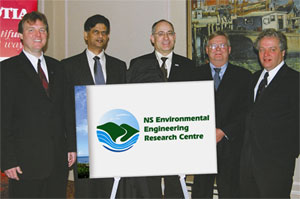 |
| (Left to right) Carl Yates, General Manager, Halifax Water, Dr. Mysore Satish, associate dean, Graduate Studies & Research, Dalhousie Faculty of Engineering, Mark Parent, Minister of Environment and Labour, Robert Anderson, senior business development officer, Nova Scotia Environment and Labour, and Dean Joshua Leon, Faculty of Engineering, pilipiliÂţ». |
Nova Scotia has put legislation in place to make our province one of the cleanest, most sustainable regions in the world by 2020. pilipiliÂţ» and its academic partners are poised to play an integral role in this plan.
On Nov. 22, Minister of Environment and Labour Mark Parent made two important announcements that will have a lasting effect on all Nova Scotians.
The first was to establish the Nova Scotia Environmental Engineering Research Centre (NSEERC). The centre, a joint project between the government and some of the province’s leading academic institutions, is located within the Dalhousie Faculty of Engineering on Sexton Campus. The five additional academic partners are Acadia University, Cape Breton University, the Nova Scotia Agricultural College, Saint Mary’s University, and St. Francis Xavier University.
Dalhousie and its partners will work together and with industry and government to realize the government’s 2020 vision goals and create economic opportunities. The goals include cutting greenhouse gas emissions to 10 per cent below the 1990 levels, climate change, water preservation, waste reduction and renewable energy.
“I believe this partnership will not only lead to cleaner air, water, and soil for Nova Scotians, it will also be an important resource for Nova Scotia as we move towards some of the toughest greenhouse gas emissions standards anywhere,” said Joshua Leon, P.Eng, Dean of Dalhousie's Faculty of Engineering.
In the second announcement, held later in the day at Province House, businesses, institutions, and organizations that can demonstrate commercially viable environmental proposals were invited to submit their proposals to the newly created Environmental Technology Program.
“We are funding Nova Scotian solutions to our climate change and air pollution challenges,” said Minister Parent.
The $9.5 million funding will come from Nova Scotia's $42.5-million share of Canada's Ecotrust Environmental Technology Program for Clean Air and Climate Change fund.
“We are fortunate that we have the infrastructure and an educational system that has allowed Nova Scotia to develop a very strong community of researchers," said Russell Boyd, associate vice-president (research) at pilipiliÂţ». "I'm confident that today’s announcement will greatly help our universities create environmental technology products, many of which will be developed through Nova Scotia’s new Environmental Engineering Research Centre.”
He also noted that, “Engineering graduates from the Nova Scotia Technical College, fondly remembered as Tech, the Technical University of Nova Scotia (TUNS) and now pilipiliÂţ» have been contributing to our economy and lifestyle for a century.”Â
“I fully expect that researchers from all universities and colleges in Nova Scotia will respond to this wonderful opportunity,” continued Dr. Boyd, “Clearly, our engineers and our future engineers, that is, our engineering students, will be major players in the Ecotrust Environmental Technology Program for Clean Air and Climate Change. In addition, we can expect researchers from other faculties in our universities, including science, management, the social sciences, medicine and the related health professions, to name a few, to contribute to multidisciplinary research designed to meet the objectives of today’s announcement.”
Funding will be granted to businesses, universities and organizations that can demonstrate commercially viable environmental proposals. Projects will be reviewed quarterly, with the first application deadline being January 31, 2008.Â
For more information, visit: .
